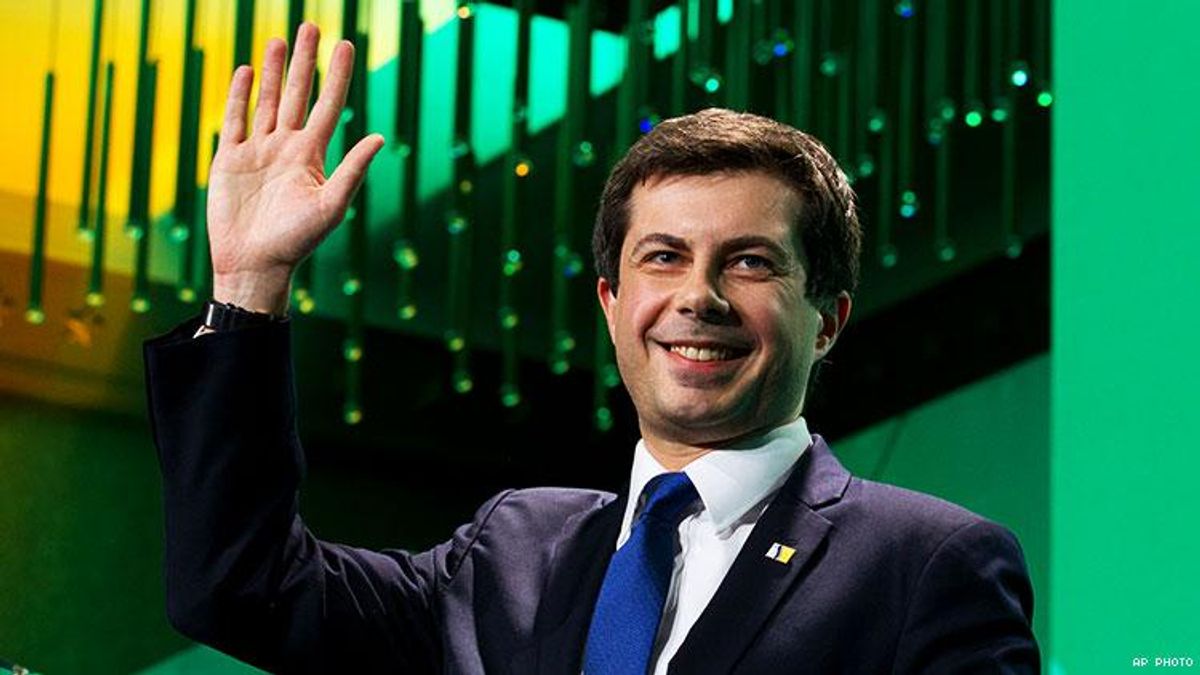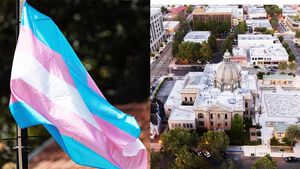I'm sitting at a table in the corner of the NoMad Hotel's Library cafe, the din of its patrons' conversations at odds with the two-level library setting. On the other side of the table sits the man who could become America's first openly gay president, if he's elected. With hollowed-out vowels and never-fried vocals, he reminds me of a news anchor -- authoritative and calm with an accent that betrays no particular region except all the ones it's not.
"Success to me, in terms of equality, would look like a world where it's not newsworthy [to be gay and running for president]," says Pete Buttigieg, who launched an exploratory committee for the Democratic nomination in January. "But I also get that it is, and I understand the importance and the sort of historic quality that could be attached to this and all that change that it represents."
Buttigieg, pronounced "BOO-da-judge," has kept a relatively lower profile than his better known Democratic contenders, though not for lack of trying. Two days before he met me in New York, he'd hosted a town hall in New Hampshire, an early primary state. As a spokesperson told me, he had plenty of press scheduled after our interview along with an event at the Brooklyn Public Library that evening promoting his new memoir, Shortest Way Home: One Mayor's Challenge and a Model for America's Future.
When lined up next to more notable candidates seeking the Democratic Party's nomination like Bernie Sanders or Kamala Harris, Buttigieg is a bit of an unknown. To craft a compelling narrative, many publications have emphasized his youth, noting that he, like fellow 2020 hopeful Tulsi Gabbard, is 37 and would be the youngest president in U.S. history if elected next year. Other outlets, like this one, have highlighted his sexual orientation, noting that he would be the first openly gay president as well as the first openly gay nominee on a major-party ticket. Lost in both of these narratives is Buttigieg's actual platform, obscured by his more easily identifiable traits.
Buttigieg has been the mayor of South Bend, Indiana, since 2011, winning reelection with 80% of the vote after coming out four years later. Overlapping with Mike Pence's single term as governor, Buttigieg describes the vice president as "fanatical" about his evangelical religious views, citing the anti-gay Religious Freedom Restoration Act as evidence. Still, he notes, he has always found a way to work with his Republican governors even when he disagrees with them.
In January, Buttigieg announced his desire to run for President. Though still in the exploratory committee phase, he tells me that "all the indicators we're seeing in the early states are pulling us in the direction of yes." He's a Harvard graduate, a Rhodes Scholar, a U.S. Navy Lieutenant, and an Afghanistan War veteran. Zoe Leonard's vision of a radical queer president he most certainly is not.
Given his smaller platform on the national stage, his chances of winning the Democratic nomination might seem slim, especially if former Vice President Joe Biden enters the race, but FiveThirtyEight says that Buttigieg has a shot if he leans into the youth vote, as he has already begun doing. The mayor also has Obama's approval and a convincing, fact-driven defense of his candidacy ready to tell his critics. "I have more experience in government than the president, more executive experience than the vice president, and more military experience than anyone to arrive at the desk since George H. W. Bush," Buttigieg told Stephen Colbert during a recent Late Show appearance.
As for his platform, Buttigieg makes a number of specific policy commitments during our interview, including electoral college reform, a version of Medicare made available for purchase as a pathway to Medicare for all, and the passage of the federal Equality Act.
The Equality Act, introduced by openly gay Rep. David N. Cicilline (D-R.I.) in 2017, would grant federal nondiscrimination protections to LGBTQ+ people, extending pre-existing protections that cover race, sex, and religion to also cover gender identity and sexual orientation. Speaker of the House Nancy Pelosi affirmed her support for the bill, vowing to make its passage a priority in this current legislative session. She should be able to do this, experts say, given the House's new Democratic majority, but the Equality Act will likely need more Democrats in the Senate and a Democrat in the White House to pass.
When I ask if he would sign the Equality Act, Buttigieg says he would. When I ask if he would sign a lesser version of the bill that dropped trans protections as part of some bipartisan compromise -- as the Employment Non-Discrimination Act's congressional sponsors did back in 2007 with the Human Rights Campaign's support -- the mayor says that he would be "hard pressed" to do so and would likely only consider it if that's what trans people wanted him to do.
On the subject of trans issues, I ask Buttigieg how he feels about incarcerated trans women getting sex reassignment surgery and other trans-affirming medical care funded by the state. The issue crept its way into the 2020 news cycle after Harris came under fire for blocking two trans prisoners from receiving their court-ordered surgeries when she was the attorney general of California in 2015. She has since said that she takes "full responsibility" for these actions but has not clarified whether she now supports funding for such procedures. Elizabeth Warren, who is also seeking the Democratic nomination, once said that paying for sex reassignment surgery is "[not] a good use of taxpayer dollars." She says she has since reversed her position.
"I consider it to be a medical necessity," Buttigieg says about state-funded surgery and other trans-affirming medical care for incarcerated trans women. "There is nothing unreasonable about it."
The mayor then says, unprompted, that the U.S. incarcerates too many people as it is. I ask him to elaborate.
"I consider criminal justice reform to be a key issue," he says. "The cost of incarceration -- and I'm not just saying the fiscal cost, but the social cost of incarceration -- is tremendous. It's clearly worsening some of the patterns of racial inequality in our country, too. I think more Americans than we realize agree on this issue. We just need more politicians to catch up."
On the topic of deportation, Buttigieg tells me he believes that abolishing U.S. Immigration and Customs Enforcement, as 2020 hopeful Kirsten Gillibrand has called for, is less important than changing the policies it enforces, saying that "it doesn't matter what you call the enforcement agency" if it's still enforcing policies like family separation at the border. When I ask him about Camila, the trans Salvadoran woman seeking asylum in the United States who was murdered after being deported, Buttigieg characterizes her deportation as being "sent to her death" and voiced support for reforming the U.S. asylum process.
As for FOSTA-SESTA -- the anti-trafficking bill package signed into law last year that has put the lives and livelihoods of sex workers, a labor class that is disproportionately LGBTQ+, at risk -- Buttigieg demurs.
"It doesn't sound like a good idea," he tells me while signing books at the Brooklyn Public Library later that night. "But I need to get more educated on it."
Beyond concrete policies, Buttigieg is also interested in pushing the left to get better at arguing its values and ideas, something, he says, the right has become quite adept at over the past few decades. He points to something like the Affordable Care Act, a "fundamentally conservative proposal," as he calls it, that the right managed to rebrand as an attack on individual freedoms. He also cites the "weight of nostalgia" that President Donald Trump has politicized with his campaign promise to "Make America Great Again," a slogan Buttigieg calls dishonest and false.
"Even if there was greatness in our past, chances are it was not quite as great as advertised, and you can never be certain because there's no going back to it. So, what does greatness look like going forward?" he says. "The ground has shifted, and I think we need to shift the ground back."
RELATED | Pete Buttigieg Explains Why America Is Ready for a Gay President

























































































